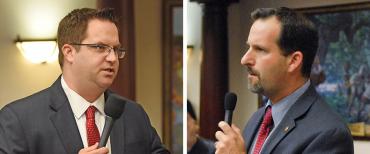
Hope is on the horizon to turn around Florida’s failing schools. On Thursday, Florida House lawmakers approved a plan to turn around failing public schools and “bring hope” back to Florida students.
Legislators approved the “Schools of Hope” bill by a vote of 77-40. Democrats unanimously voted against the bill.
HB 5105, sponsored by Reps. Chris Latvala, R-Clearwater, and Mike Bileca, R-Miami, would speed up the time for school districts to turn around failing schools in Florida. The proposal would also set aside $200 million in startup costs to attract new charter schools for students attending failing schools statewide.
The allotted funds would pay for teacher recruitment and extending school days. It would affect 77,000 Florida students stuck in 115 “D” and “F” schools statewide.
Under current law, Florida schools are given three years to turn around failing schools, but HB 5105 would slash a year off that timeline and give districts only two years to fix “failure factories.”
Members debated the proposal for hours, disagreeing over how effective the bill would be and how much ‘hope’ HB 5105 would actually give to students trapped in failing schools.
To opponents of the measure, the proposal was too risky -- and the rewards were less than certain.
“Essentially that is what this bill is doing…[is] hoping [schools] would have that same success again,” said Rep. Kamia Brown, D-Ocoee, who criticized the measure for ‘throwing money’ at out-of-state charter programs. “That key word is ‘hope.’”
“This is a deeply flawed bill,” said Rep. Joe Geller, D-Aventura. “It seems to me, that to some degree, this is a departure that is not...based on facts and evidence. Despite some good intentions, all stakeholders, including our kids, have really not been taken into sufficient account here.”
Geller and House Democrats contended there was no guarantee the legislation would actually work and urged their fellow lawmakers to instead pump the $200 million into the public school system.
Florida has been there, and done that, Republicans said -- and to no avail.
“We’ve done that already,” said Rep. Jake Raburn, R-Lithia. “We’ve tried that, and it didn’t work.”
The time is now, GOP representatives said, to change the course of Florida’s failing schools.
“It’s time that we provide families with more options than they are currently [given],” said Rep. Jake Raburn, R-Lithia. “It’s time for a new approach and new strategies. It’s no longer okay to say ‘no’ to these kids sitting in these failing classrooms.”
All 115 schools targeted in the legislation have been failing for at least three years, while one school in Jacksonville has received a failing grade for over 10 years.
“I firmly believe the best opportunity for our traditional public schools..is to see these examples of excellence,” said Rep. Bileca.
“A zip code should not be the determining factor of a student's success in Florida,”
The charter schools, called “hope operators” would operate under a performance-based agreement, receiving a yearly letter grade similar to public schools. If a school fails to meet the agreement, school districts could put the kibosh on the charters and shut them down early. Part of the performance-based agreement for charter schools would require schools to be graded like all other public schools statewide.
HB 5105 is a relatively new bill in the state legislature, but lawmakers wasted no time pushing it through committees at warp speed after introducing it late last month.
A top priority for House Speaker Richard Corcoran, the bill aims to have nonprofit organizations with histories of success head to Florida and make success stories out of failing schools, but it appears it might not be that easy.
A POLITICO article found many of the organizations Corcoran mentioned to put failure factories on the path to improvement have no plans to open up schools in Florida at this time.
The bill now heads to the Senate for approval.
Reach reporter Allison Nielsen by email at allison@sunshinestatenews.com or follow her on Twitter: @AllisonNielsen.


